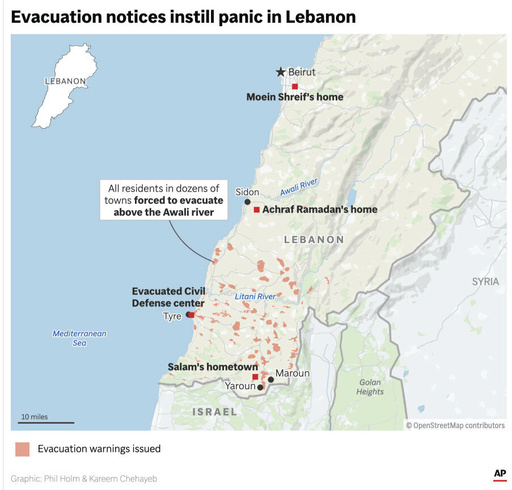BEIRUT — As the conflict between Israel and Hezbollah escalates, the toll on ordinary Lebanese citizens becomes increasingly evident, particularly during the nighttime hours when Israeli forces typically announce impending airstrikes. These warnings are meant to facilitate evacuations, but they illustrate the mounting danger faced by civilians caught in the turmoil.
Recently, Moein Shreif, a well-known Lebanese pop singer, experienced this unsettling reality firsthand when he was roused from sleep at 3 a.m. by a neighbor informing him of an imminent Israeli strike on nearby buildings in his suburb south of Beirut, an area known for Hezbollah’s stronghold. Shreif, along with his wife and three children, fled their apartment building, driving away just before explosions devastated their home and the neighboring structure.
“I barely had time to change out of my pajamas,” Shreif remarked, returning that day to find his building reduced to smoldering debris. “I didn’t manage to grab anything from the house.”
The violence between Israel and Hezbollah has ramped up significantly since the onset of the Gaza conflict, with regular exchanges of fire leading to escalating tensions. Hezbollah’s retaliation has included ongoing rocket launches into Israeli territory, while Israel has been focused on countering those strikes, displacing thousands of Israelis in the process.
Following an expansion of Israeli air campaigns targeting Hezbollah, Lebanese civilians began to receive real-time alerts about potential airstrikes, a situation that human rights advocates criticize for often being insufficiently communicated and misleading. On September 23, approximately 80,000 calls were made into Lebanon as part of this warning system, igniting widespread panic among residents, causing schools to close, and prompting many to rush home, culminating in one of the deadliest days for Lebanon in recent history with over 500 fatalities.
Israel’s regular warnings have persisted in the aftermath, informing 27 villages in southern Lebanon to evacuate towards the Awali River. This directive led Salam, a 42-year-old mother of two, to flee her village of Ain Ebel, where she is currently sheltered with relatives in Beirut. Salam expressed confusion and frustration over the evacuation order, especially since her predominantly Christian village has yet to face bombardment, unlike its surrounding Shiite Muslim communities.
Despite limited evacuation notices compared to those issued in Gaza, officials on both sides share a similar narrative. In Gaza, Israel claims to target Hamas militants who operate among civilians, while in Lebanon, similar accusations are directed towards Hezbollah. The Israeli military’s warnings often surface first on social media, later amplified by local news outlets. They instruct residents to evacuate “immediately,” yet are frequently followed by strikes that extend beyond the warned areas, despite claims that the military is targeting specific Hezbollah assets.
The number of displaced individuals in Lebanon has skyrocketed to at least 1.2 million, with many forced out since the uptick in airstrikes late last month. Over 800 of the available 1,000 shelters are already overcrowded, leading to a humanitarian crisis. The United Nations human rights division indicates that a quarter of the country’s territory is now under displacement orders issued by Israel.
Critics, including Human Rights Watch, have voiced concern over the legality and efficacy of such evacuation orders, suggesting that designating an entire village for evacuation improperly implies that those who choose to stay may be considered combatants. The organization argues that Israel has a responsibility to safeguard those unable to evacuate.
Amnesty International has also raised alarms regarding the potential for mass displacement created by these widespread evacuation orders. Several of these warnings have come in the form of animated videos portraying various scenarios related to hidden Hezbollah weapons in civilian spaces, instructing individuals to leave immediately upon discovery.
However, not all airstrikes are preceded by warnings. For instance, in Ain el-Delb, an airstrike resulted in the collapse of a residential building, entombing approximately 70 individuals, leading to fatalities and injuries. Survivors like Achraf Ramadan, who managed to escape with injuries, lament the devastating violations occurring within their neighborhoods and express a sense of abandonment by the global community.
“This community has always been peaceful,” said Ramadan, with a tone of despair. “The international community seems unresponsive, providing Israel with justification for its actions under the guise of self-defense.”
